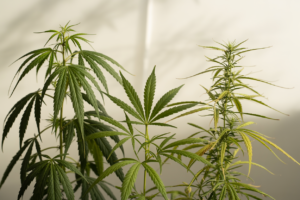THCP: A New Frontier in Cannabis Research

Contents
Contents
Introduction
Tetrahydrocannabiphorol (THCP) is a newly discovered cannabinoid that has generated significant interest in the cannabis community since its discovery in 2019. This compound is reshaping our understanding of cannabis’ potential effects. This overview explores THCP’s discovery, chemical properties, and potential implications for both recreational and medical cannabis use.
THCP: The Discovery
THCP was discovered in 2019 by researchers using advanced chromatography and spectrometry techniques to isolate and identify cannabinoids present in cannabis. This breakthrough revealed a compound similar to THC but with unique structural characteristics that contribute to its distinctive effects.
Properties of THCP
The chemical structure of THCP is similar to that of THC, but it has a longer alkyl side chain. This seemingly small difference significantly impacts its potency. THCP has a much higher binding affinity for CB1 receptors in the brain, which are part of the endocannabinoid system, resulting in stronger effects compared to THC.
Scientific Insights into THCP Structure
THCP’s longer alkyl side chain (seven carbons compared to THC’s five) enhances its ability to bind to cannabinoid receptors, particularly CB1. This increased binding affinity is what makes THCP potentially 30 times more potent than THC. Understanding this difference at the molecular level highlights why even small structural variations can have significant physiological effects.
Comparative Analysis: THCP vs. Other Cannabinoids
While THCP is often compared to THC due to their structural similarities, it is important to also consider other cannabinoids. For example, THCV (tetrahydrocannabivarin) has been found to act as an appetite suppressant, whereas CBD (cannabidiol) is well-known for its non-psychoactive properties and potential anti-inflammatory benefits. THCP’s unique binding affinity makes it stand out in comparison, providing a potent psychoactive effect that differs significantly from the therapeutic focus of cannabinoids like CBD.
Potency and Effects
THCP is estimated to be up to 30 times more potent than THC, primarily due to its higher binding affinity to CB1 receptors. As a result, THCP can produce stronger psychoactive effects, such as intense euphoria and heightened sensory perception. This potency also suggests that THCP may provide therapeutic benefits at lower doses, potentially minimizing side effects associated with higher doses of THC.
Potential Risks and Side Effects
Given its high potency, THCP may also pose certain risks. The intense psychoactive effects could lead to increased anxiety or paranoia in some users, especially at higher doses. It is essential for consumers to be aware of the potential for stronger reactions and to approach THCP with caution, particularly if they are inexperienced with cannabis.
THCP Key Takeaways
- Legal Status: Complex and often mirrors THC regulations.
- Consumer Availability: Limited, due to the rarity of THCP in natural cannabis strains.
- Market Impact: Growing consumer interest, particularly in new and potent cannabinoid products.
- Medical Research: Still in early stages but shows promise for unique therapeutic benefits.
- Regulatory Challenges: Legal ambiguities persist, requiring adaptation as policies evolve.
Legal Status and Consumer Availability
The legal status of THCP is complex and largely parallels that of THC. It varies significantly by region; in some areas, it is subject to broader cannabis regulations, while in others, its legal standing remains undefined due to its recent discovery.
THCP is naturally found in cannabis, but only in very small amounts, making it rare for consumer use. There is increasing interest in synthesizing THCP to make it more readily available for both research and consumer applications.
Impact on the Cannabis Market
The discovery of THCP has ignited interest among consumers looking for potent effects and novel experiences. As research on THCP progresses, it is likely to lead to the development of new cannabis products, especially in the medical sector, given its potential therapeutic benefits at lower doses.
Examples of Current Research and Products in Development
Recent studies are examining THCP’s efficacy in managing pain, anxiety, and sleep disorders. Some cannabis companies are also exploring the production of THCP-infused products, such as tinctures and edibles, that aim to provide users with a controlled experience of its potent effects. These products are still in the experimental phase but could become available as research and regulations progress.
Future Research and Industry Impact
THCP has the potential to significantly impact medical cannabis research, particularly in the treatment of conditions like chronic pain and anxiety. Its unique properties are expected to inspire the creation of innovative products, including new cannabis strains, edibles, and concentrates specifically formulated to leverage the potency of THCP.
Regulatory and Legal Changes
As more research is conducted on THCP, its legal and regulatory status will likely change. Cannabis industry businesses must stay informed and adapt to evolving regulations to ensure compliance and capitalize on market opportunities.
Industry Expert Perspectives
Dr. Jane Smith, a leading cannabis researcher, notes, “THCP represents a significant leap in our understanding of cannabinoids and their potential applications. Its high potency could be a game-changer for medical treatments, but it also requires careful consideration regarding safety and regulation.” Such expert insights highlight the importance of balancing potential benefits with responsible usage and regulation.
Educating Consumers
Raising awareness of THCP is crucial for both consumers and professionals in the cannabis industry. Dispensaries and retailers have a responsibility to provide accurate information about THCP, its effects, and its legal status to promote safe and informed consumption.
Conclusion
THCP represents a major advancement in cannabis science, with significant potential for both medical applications and consumer products. Its discovery underscores the importance of ongoing research, innovation, and education in the rapidly evolving cannabis industry.
Disclaimer
The information provided in this article is intended for educational purposes only and should not be considered medical or legal advice. The legal status of THCP can vary by region, and its effects may differ between individuals. Always consult with a healthcare professional or legal expert before making any decisions regarding THCP or other cannabis products.
Subscribe for Updates
Stay informed about the latest developments in cannabis research and industry trends. Subscribe to our newsletter to receive updates, insights, and exclusive content directly to your inbox. Don’t miss out on the future of cannabis innovation!




